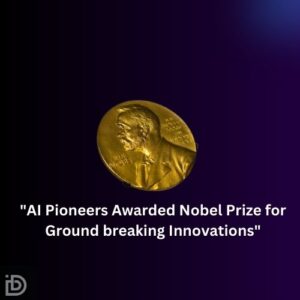2024 Nobel Prize in Physics Awarded to AI Pioneers John Hopfield and Geoffrey Hinton for Foundational Contributions to Modern Artificial Intelligence
Two groundbreaking scientists, John Hopfield and Geoffrey Hinton, have been awarded the 2024 Nobel Prize in Physics for their pioneering work in artificial intelligence and machine learning. Their early contributions, which date back to the 1980s, laid the foundation for today’s cutting-edge AI and generative models, revolutionizing how machines mimic human functions such as memory and learning.
How Hopfield and Hinton Shaped Modern AI
John Hopfield’s breakthrough came in 1982 with the discovery of ‘associative memory,’ also known as the Hopfield Network. This neural network could store and reproduce patterns, even if the input data contained errors or was partially erased. His model’s ability to recreate noisy or incomplete information mirrors the processes used in today’s large language models, which are capable of handling vast amounts of complex data.
Building on Hopfield’s work, Geoffrey Hinton, often referred to as the ‘Godfather of AI,’ developed the Boltzmann Machine in 1985. This generative model, inspired by the statistical physics of Ludwig Boltzmann, could recognize familiar patterns in data it had not seen before, much like how humans can identify familiar traits in new objects. The Boltzmann Machine laid the groundwork for many of the machine learning techniques used today in AI systems.
AI Inspired by the Human Brain
Both Hopfield and Hinton’s research was inspired by how the human brain learns and processes information. By modeling artificial neural networks after human neural networks, they helped shape the architecture of today’s AI, where computer models are trained to recognize and interpret complex patterns—transforming industries from tech to space exploration.
Professor Peter Gallagher, head of astrophysics at the Dublin Institute for Advanced Studies, explained the profound impact of machine learning on fields such as space science. “Machine learning is transforming how researchers analyze and interpret complex datasets,” he said. “It allows us to automatically find and characterize large numbers of solar radio bursts that would be impossible to detect manually.”
Rhodri Cusack, a neuroscience professor at Trinity College Dublin, emphasized that AI neural networks provide valuable insights into brain processes. “Machines are helping us understand ourselves, which in turn leads to new technological advances,” Cusack said. “None of this would be possible without the trailblazing work of Hopfield and Hinton.”
A Legacy of AI Innovation and Concerns
Despite his monumental contributions to AI, Geoffrey Hinton has recently voiced concerns about the rapid advancement of AI technologies. After leaving his role at Google, Hinton warned that the flood of AI-generated data could make it increasingly difficult for people to discern what is real. Earlier this year, Hinton was also awarded the Ulysses Medal by University College Dublin for his contributions to society, specifically his development of backpropagation—a key method for training neural networks.
As the world continues to explore the potential of AI, the foundational work of John Hopfield and Geoffrey Hinton will remain crucial to the ongoing development of this transformative technology. Their Nobel Prize recognition highlights the profound impact of their contributions, not just on artificial intelligence but on understanding the human brain and the nature of intelligence itself.

